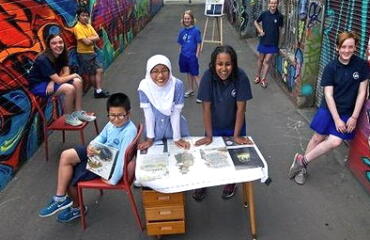With the effects of climate change already being witnessed across the continent, First Nations community leaders and experts have urged Australian governments and industry to draw upon traditional knowledge as part of a coordinated response to the crisis.
“We have survived climate change before,” Kado Muir, chair of the National Native Title Council and a Wati man and Ngalia Traditional Owner (WA), told an online forum hosted by the National Climate Emergency Summit in Melbourne.
“Our traditions, our oral histories talk about the changes that have come before, particularly the emergence of the deserts themselves, which are a result of the glacial activities of the last ice age,” said Mr Muir.

The panel shared concerns about First Nations people experiencing rising tides in places like the Torres Strait, and hotter, drier conditions in the Western Australian desert, noting that despite this heightened vulnerability and hundreds of generations of knowledge, an Indigenous voice was still largely missing from Australia’s climate change response.
With appropriate resources and support, “there are some really proactive moves which fit with our cultural connection to country and looking after country,” said Nolan Hunter, former chief executive of the Kimberley Land Council and a Bardi man (WA).
Mr Muir said the role of Indigneous fire management, the practice of using timely, carefully-placed burns, developed over thousands of years, has been cast aside in bushfire mitigation planning.
“Lands have not been managed and supported in a way they should have.”
He criticised the government for “cherry-picking” Aboriginal knowledge and insights, and failing to engage in valuable cultural and spiritual dialogue with Elders and communities.
“We have systems of knowledge that can help the rest of the world.”
Dr Emma Lee, a research fellow at the Swinburne University of Technology and Trawlwulwuy woman of Tebrakunna country (north-eastern Tasmania), said repairing broken relationships between Indigenous peoples and non-Indigenous Australians was key to improving a national response to the climate emergency.
“This is nothing to do with money, but it has everything to do with walking together, speaking together,” she said.
Although half of Australia’s land and sea territories are under some form of Indigneous land title, the panel stressed that an often confusing mix of outdated legislation was failing to provide adequate protection to Indigenous land, which has led to the destruction of sacred sites.

Over half of Australia’s land and and sea mass is held under Indigenous land title. Map: Jon Altman and Francis Markham.
Rio Tinto’s demolition of the 46,000 year old Juukan Gorge rock shelters in May last year revealed the weakness of existing legislative protections.
Critics have said the Native Title Act (NTA) is “flawed” and exacerbates the lopsided bargaining power between mining companies and the traditional owners. Under the NTA traditional owners are given a six-month period to negotiate the terms of a lease, after which mining can proceed with no Indigenous oversight. Traditional owners also lack the right to veto a mining project on the basis of environmental or heritage concerns.
While the Australian Parliament’s Joint Standing Committee on Northern Australia’s interim report vowed to “never again” allow for the total demolition of Indigenous heritage sites, the panel was sceptical of this promise.
“It should not mean ‘never again until the next time’, and sadly we seem to be heading into the next time,” said Mr Muir.
In acknowledging that current mining methods are “extractive and exploitative”, Mr Muir said Indigneous communities are open to working with industries to develop more sustainable approaches to extraction using Indigenous cultural and spiritual knowledge.
“We do know how to take resources from the land in a sustainable manner that then contributes to the empowerment of our people, our environment, and our culture.”
The National Climate Emergency Summit #Reset21 forums are running online in Melbourne over February. For more information, and to watch this session and others, click here.

